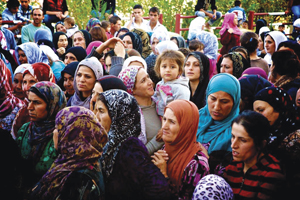By BETSY TAYLOR
ASCENSION HEALTH
A team of doctors with ties to St. John Health System in Tulsa, Okla.,
recently returned from a medical relief trip to Iraqi Kurdistan where they
provided care to hundreds of Syrians who are among the millions displaced by war
in their country.
Arab Spring demonstrations, many of which began peacefully in the Middle East
and North Africa in late 2010 and early 2011, evolved into a brutal crackdown
and complicated conflict in Syria. President Bashar al-Assad remains in power as
civil war rages and it's estimated more than 100,000 Syrians have been killed.
About 2.2 million Syrian refugees in the Middle East have fled their nation for
neighboring countries, according to the U.S. Agency for International
Development.

Syrian refugees wait for a visit with a doctor from the "In His Image" team that recently cared for those staying in the Iraqi Kurdistan town of Koya.
Settling in
From Oct. 26 to Nov. 5, doctors from Tulsa, including five medical residents
in the In His Image Family Medicine Residency Program based at St. John Medical
Center, flew to Erbil in Iraqi Kurdistan, then drove about an hour and a half to
Koya, an Iraqi town where about 3,500 Syrian refugees have relocated over the
past year. The 12-member team worked with World Compassion, another Tulsa-based
international ministry, which had done previous work in Koya and had built
relationships in the region, said In His Image doctors.
The team brought about 15 50-pound suitcases filled with medicines, hired
translators from a nearby university and set up a temporary clinic at an Iraqi
ophthalmologist's building in the town.
Dr. Mitch Duininck, program director of the In His Image Family Medicine
Residency, said many of the Syrians in the town were ethnic Kurds from the
middle class — professionals, students and shopkeepers. Local Iraqis and Syrian
refugees helped to organize the visits with the Tulsa doctors. Duininck said
doctors brought supplies to treat many of the medical conditions they saw in the
Koya clinic, including respiratory infections, gastrointestinal infections and
skin infections. They dispensed multivitamins for both adults and children
because maintaining proper nutrition has been difficult for many of the
refugees.
"We know there are a lot of musculoskeletal complaints when people are
displaced from their homes," Duininck said. "Sometimes, there's trauma.
Sometimes there's poor sleeping and living conditions, a lot of physical work, a
lot of headaches." Doctors also saw patients previously diagnosed with heart
disease, diabetes and hypertension who didn't have access to the medications
they'd normally be taking. The doctors operated a small on-site lab and ran a
pharmacy using their supplies.
Adaptive doctoring
Dr. Ambria Harris, a third year resident in the In His Image program, said
working in Koya she had to rely more on taking a detailed medical history from
patients and on physical exams, rather than imaging scans or the results of
complex lab tests as those diagnostic tools were not available in the temporary
clinic. However, some of the refugees brought their medical records or previous
X-rays with them, she said.
Many of the Syrian women wanted to see a female physician, and many had
questions about behaviors in their children, such as trouble sleeping,
nightmares and bedwetting. The In His Image doctors undergo training with
clinical psychologists in the U.S., who provide an overview of post-traumatic
stress disorder. Harris said listening to worried patients, explaining that
children may be traumatized from the war and suggesting how parents can
communicate with children about what they've seen and respond to the children's
anxiety and concerns can be a help.
Some of the team also spent one day caring for Iranian refugees, who had
lived in Iraqi Kurdistan for several years.
While in Koya, the team accepted accommodation at a vacation resort. While
not luxurious, Harris said it has a Ferris wheel, go-carts and bumper cars, and
it is a vacation spot for locals.
Harris, a 29-year-old from Clarkston, Wash., has been on medical mission
trips to China, Brazil, Vietnam, India and Egypt. She plans to work as a doctor
in China after she completes her residency.
Mission-minded
doctors
The In His Image Family Medicine Residency serves as the foundation for In
His Image International, the medical missions organization, and Good Samaritan
Health Services mobile medical vans in the Tulsa area. The residency program
accepts 10 residents a year from the United States and foreign countries. It has
15 faculty attending physicians and about 50 partner physicians who teach
residents their specialties during rotations. It is accredited by the
Accreditation Council for Graduate Medical Education, like other
university-based and affiliated family medicine programs. The faith-based
program draws Christian physicians, many of whom complete an international
health rotation, explained Blair Kesler, the In His Image International
development coordinator.
"We believe when we care for people it's out of a heart of love for God,"
Duininck said.
In Kurdistan, in addition to delivering medical care, the doctors focused on
actively listening to the refugees' stories and offering comfort. "It's
encouraging them. It's consoling them. It's being present in their suffering and
their pain, and listening to them," he said. Duininck, who has treated people in
times of strife and natural disasters internationally, added, "People, I find,
are just survivors. They're often in very desperate situations, and yet with a
little bit of help and a little bit of encouragement, the strength of who they
are as people is really remarkable. So when we listen to their stories, we
encourage them. Often, we pray with them." Duininck said he asks patients:
"Would you like us to pray with you? Would you like us to pray for you today?"
Copyright © 2013 by the Catholic Health Association
of the United States
For reprint permission, contact Betty Crosby
or call (314) 253-3477.